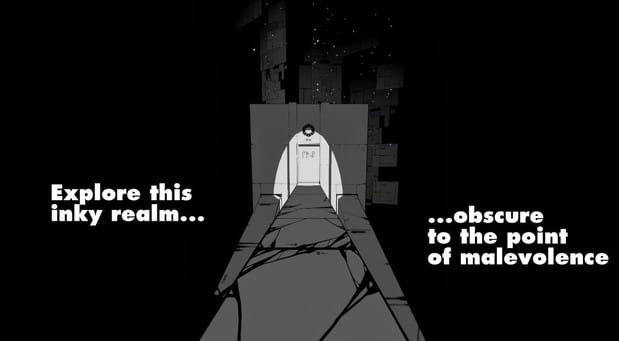We like to feel powerful. It’s why many play videogames in the first place: to lurk behind the eyes of one bigger/faster/better than we are and pull the strings. We like to feel smart. We like to appear competent, to others and ourselves. So what happens when that competence is stripped away and we’re left groping through the dark? Who would choose such a powerless future?
Starship Damrey, by Level-5, and Hiversaires, by French artist Devine Lu Linvega, offer such an opportunity. Each drop their players in a labyrinth of their own ignorance and assume we’re smart, patient, and observant enough to make our way out. At first you don’t even recognize the decision. You wait for clues, a glowing arrow, a floating guide who speaks in highlighted words. None arrive. The choice is near-blinding in this day and age of hand-holding tutorials and Easy Modes, as if, after years of light shone in our eyes to help us see, the bulb burns out and we’re left gaping into that hazy after-effect, our vision a shimmery black.
Each game accomplishes this in their own way. Damrey limits your basic human functions: language, mobility, sight. The game proper is akin to a point-and-click adventure; you awake from a cold sleep, stuck in a pod aboard the titular spaceship. The very first action you perform in order to progress is input the correct command into an old DOS-style prompt. To thirtysomething players, it’s a smack of nostalgia. To our younger siblings, the screen is hieroglyphics from an obscene age.
Your only way to move is by directing an Assist Robot (AR) through the ship’s environment. For most of the game, the 3DS top-screen shows your robot’s perspective. On the bottom-screen, silent and still, is the view from within your pod capsule, your body covered by a blanket. All you see are the curved protrusions of feet and a lower torso: this is a first-person cryonics simulator. On the walls of your pod are tokens of your awakened life: a picture of a woman, a sheet of instructions. Think of office cubicle fare for the medically-frozen.
You move your robot through hallways, unlocking rooms and opening up more of the ship. All you know: Something’s gone horribly wrong. The robot’s “eyes” are something of a head-lamp, and a dim one at that; as the machine rolls forward, only the first couple of meters are visible. Movement is limited to cardinal directions. There’ll be no peeking around corners or arching your neck 360 degress. You creep forward down darkened corridors, no sound but the whirring of your machinery, all changes of direction lumped into right angles. This is Alien by way of King’s Quest. Japanese developers are noted for having a keyword that drives the entire game’s design ethos. I have a few guesses: Claustrophobia; Unknown; Silence.
This is a first-person cryonics simulator.
Hiversaire’s approach is even more limiting but, strangely, feels less closed off. You’re dropped into an alien world, a place of floating sidewalks and top-less birch trees. You move through static screens, one after the other; tap the middle of your screen to move forward, tap left to go left, tap right to go right. A low ambient tone scores your exploration. Each scene looks cut from a Rorschach test by an exacto knife. Strange symbols cover walls and tablets. This might be an ancient land, or some future dystopia, or the dreams of a dying astronaut stuck in orbit around the moon.
At first nothing makes sense. If you’re like me, you’ll want to quit after ten seconds, stuck at the very first door you approach with no way in. But you’ll stick around since there’s so little dexterity required: all you need to do is tap. Explore this inky realm and its secrets, obscure to the point of malevolence, reveal themselves. Return to that door and when it opens feel an unexpected elation. The quiet, ethereal mystery of Devine’s interactive illustrations soon gives way to frantic tapping, neglecting the thoughtful consideration this environment demands.

Line up a few glyphs haphazardly; the luck you had once acts as a salve to your growing anxiety, but also as unwarranted corroboration. You will not go far with random translation here. Because that’s what Hiversaires is: A foreign language in need of a dictionary.
Devine has gone farther than co-opt runes from dusty textbooks; he’s created his own set of words and symbols that in fact live outside the confines of the game itself. He calls the language Traumae, an apt title. To exist inside Hiversaires is to feel, for a moment, the immediate consequence of a blunt impact to the head. Nothing makes sense. You see stars. But, as the pain dulls, and the endorphins kick in, you feel good in spite of this newfound, temporary stupidity. Sometimes ignorance truly can be bliss.




